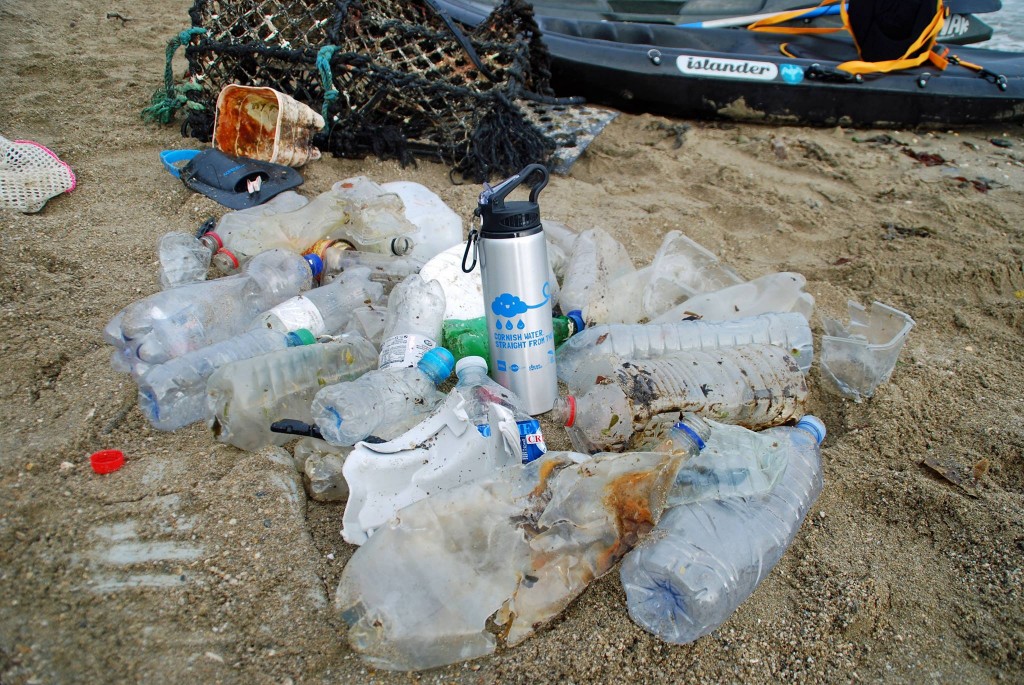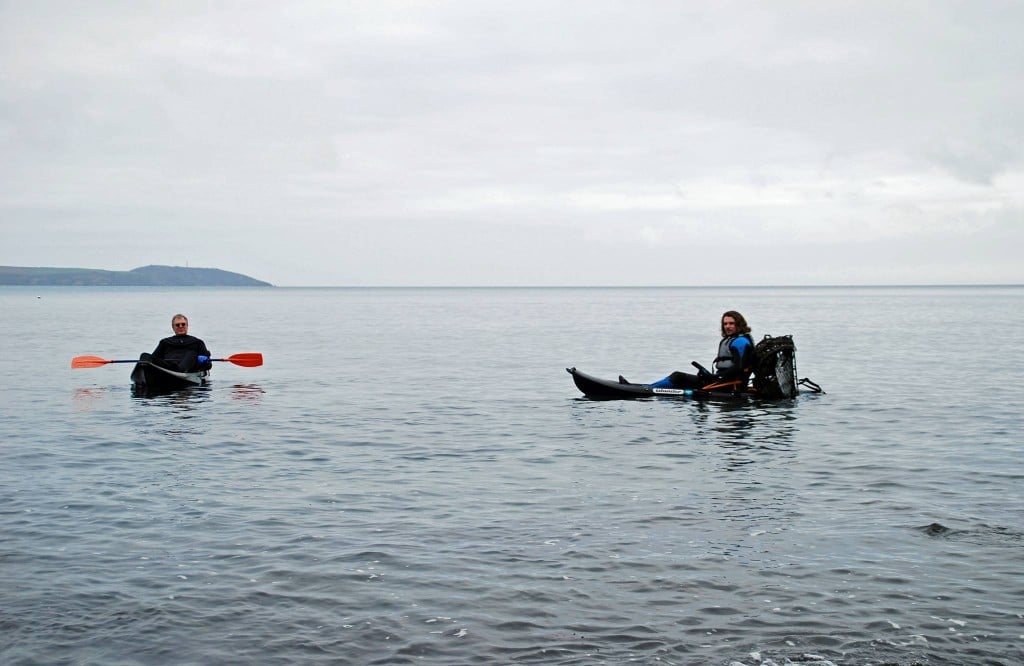Marine Life & Conservation
Fathoms Free launches new ‘Paddle for Plastics’ campaign to clean our oceans

Throw-away plastic is likely to be one of the greatest threats our planet has ever encountered. It is a problem which we have all unintentionally been a part of, with marine debris littered across the globe reaching a critical point. Since conservation group Fathoms Free began in 2014, they have seen how the 300 million tonnes of plastic being produced each year can affect the oceans – but ultimately, the way we view ocean plastics needs to change.
With this idea in mind, their latest campaign, Paddle for Plastics, aims to encourage a more practical solution to our plastic problem by inviting the public to go out onto their kayaks to clean up marine waste. It is based around an ambitious initiative which involves recycling plastic found in clean-ups and turning them into kayaks. The plan is to feed back into a circular economy model and utilise wasted plastic. These kayaks will be the first of its kind, and they will also offer a means in which difficult areas can be accessed and waste can be disposed of.
For over two years, Founder of Fathoms Free, Robert Thompson has been in partnership with Keep Britain Tidy to develop this circular economy business model. The first stage of the initiative is building the infrastructure: ocean plastic collection, recycling, storage facilities, research and their business model. Keep Britain Tidy have helped Fathoms Free to build this infrastructure and with their support, 7 tonnes of beach waste has been recycled over the past year. The plastic that gets collected is sorted and recycled into the raw material for products; Fathoms Free have now successfully produced a body board and are in the final stages of creating a prototype sit-on-top kayak.
The Fathoms Free business model is based on the principle of diverting profits back into funding conservation activities within both Fathoms Free and the community. They have had discussions with various partners, such as National Trust and Cornwall Wildlife Trust who would like to support the campaign and use the kayaks in their activities.
The project was recently awarded second place at the Cornwall Sustainability Awards ceremony in the category of Tomorrow’s Contribution Towards Sustainability, judged by a panel of leading experts in their fields at Cornwall and Isle of Scilly Local Enterprise Partnership.
As the threat of plastic becomes increasingly desperate, Fathoms Free have launched the Paddle for Plastics campaign because they need help from everybody to clean our seas.
To find out more about the Fathoms Free Paddle for Plastics campaign, click here.
Marine Life & Conservation
Leading UK-based shark conservation charity, the Shark Trust, is delighted to announce tour operator Diverse Travel as a Corporate Patron

 Corporate Patrons provide a valuable boost to the work of The Shark Trust. The Trust team works globally to safeguard the future of sharks, and their close cousins, the skates and rays, engaging with a global network of scientists, policymakers, conservation professionals, businesses and supporters to further shark conservation.
Corporate Patrons provide a valuable boost to the work of The Shark Trust. The Trust team works globally to safeguard the future of sharks, and their close cousins, the skates and rays, engaging with a global network of scientists, policymakers, conservation professionals, businesses and supporters to further shark conservation.
Specialist tour operator Diverse Travel has operated since 2014 and is committed to offering its guests high quality, sustainable scuba diving holidays worldwide. Working together with the Shark Trust will enable both organisations to widen engagement and encourage divers and snorkellers to actively get involved in shark conservation.
“Sharks are truly at the heart of every diver and at Diverse Travel, we absolutely share that passion. There is nothing like seeing a shark in the wild – it’s a moment that stays with you forever!” says Holly Bredin, Sales & Marketing Manager, Diverse Travel.
“We’re delighted to celebrate our 10th year of business by becoming a Corporate Patron of the Shark Trust. This is an exciting partnership for Diverse and our guests. We will be donating on behalf of every person who books a holiday with us to contribute towards their vital shark conservation initiatives around the world. We will also be working together with the Trust to inspire divers, snorkellers and other travellers to take an active role – at home and abroad – in citizen science projects and other activities.”
Paul Cox, CEO of The Shark Trust, said:
“It’s an exciting partnership and we’re thrilled to be working with Diverse Travel to enable more divers and travellers to get involved with sharks and shark conservation. Sharks face considerable conservation challenges but, through collaboration and collective action, we can secure a brighter future for sharks and their ocean home. This new partnership takes us one more valuable step towards that goal.”
For more information about the Shark Trust visit their website here.
For more about Diverse Travel click here.
Marine Life & Conservation
Shark Trust Asks Divers to help with Shark Sightings this Global Citizen Science Month

 Whether you are stuck for ideas of what to do with the kids or are off on the dive trip of your dreams. You can get involved in Citizen Science Month and help the Shark Trust by providing vital data about sharks are rays both close to home and further afield.
Whether you are stuck for ideas of what to do with the kids or are off on the dive trip of your dreams. You can get involved in Citizen Science Month and help the Shark Trust by providing vital data about sharks are rays both close to home and further afield.
In addition to reporting the sharks and rays you see on your dives, the eggcases you find on the beach, the Shark Trust is looking for some specific data from divers who are asked to report any Oceanic Whitetip and Basking Sharks.
Oceanic Whitetip Sharks
The Shark Trust are looking specifically for Oceanic Whitetip Shark sightings over the coming weeks and months. So, if you are diving anywhere in the world, please report your sightings via the website or app.
Website: https://recording.sharktrust.org/
App: Search The Shark Trust in your app store
The Oceanic Whitetip. Known for their incredibly long dorsal and pectoral fins, this species was once the most abundant oceanic-pelagic species of shark on the planet.
Large and stocky, they are grey or brown above, and white below and famous for their huge rounded first dorsal fin and paddle-like pectoral fins. The fins also highly prized within the shark fin trade. Whilst they are mostly solitary, Oceanic Whitetips do occasionally hunt in groups.
An inquisitive species, they were easy prey for fisheries. Combined with their low reproductive rate, they were inevitably at high risk of population depletion. And declines of up to 99% have been reported in certain sea areas. They are listed as Critically Endangered on the IUCN Redlist (2019).
Conservation efforts to discourage further declines include listing on CITES Appendix II and CMS Appendix I. They’re also the only species prohibited from take by all the Tuna RFMOs (Regional Fisheries Management Organisations). However, these measures do not mean that Oceanic Whitetips are not still caught – whether targeted or as bycatch – in some parts of the world. With populations declining at such a high rate, effective implementation of management measures is essential to ensure that the species can recover.
If you are lucky enough to get an image of an Oceanic Whitetip and you record your sighting on the Shark Trust app or website YOU CAN WIN! All images submitted with sightings, that also give consent to use in conservation messaging, will be in with a chance to win an Oceanic Whitetip T-shirt and mug. The competition will run until the end of “Shark Month” in July – so keep those sightings (and images) coming in.
Basking Sharks
Basking Shark (Cetorhinus maximus) season is upon us, and the Shark Trust is asking everyone to keep an eye out for these majestic giants over the summer months. If you see any, you can record your sighting to the Basking Shark Sightings database.
Each year, these mighty fish return to British waters to feed on plankton. You may see one, (or a few if you’re really lucky) from around April-October. They can be seen feeding at the surface of the water, where they look like they’re basking in the sun. Thus, their name!
Sighting hotspots around the British Isles include southwest England, Isle of Man, north coast of Ireland, and western Scotland. The Sea of the Hebrides is the most prolific sightings area in Scotland, but they have been spotted all around the coast and have even ventured into some of the sea lochs. The Shark Trust has received thousands of sightings since the Basking Shark project began, but more data is needed to truly understand what is going on with population numbers and distribution. You can help by recording your sightings this summer.
Great Eggcase Hunt
The Shark Trust has an Easter Egg Hunt with a difference for you to try. Take part in the Great Eggcase Hunt and get involved with a big citizen science project that helps shark, ray and skate conservation. And it’s an enjoyable activity for all the family.
The Shark Trust also want snorkellers and divers to record their underwater eggcase findings. Underwater records help pinpoint exactly where sharks and skates are laying their eggs and can help link to beach records. Learning the depth and substrate that they lay on also helps better understand the species.
Find out more: https://www.sharktrust.org/great-eggcase-hunt
Whether you are diving, snorkelling or exploring on the beach you can take part in Citizen Science Month and get actively involved in shark and ray conservation. Find out more: www.sharktrust.org
-

 News3 months ago
News3 months agoHone your underwater photography skills with Alphamarine Photography at Red Sea Diving Safari in March
-

 News2 months ago
News2 months agoCapturing Critters in Lembeh Underwater Photography Workshop 2024: Event Roundup
-

 Marine Life & Conservation Blogs2 months ago
Marine Life & Conservation Blogs2 months agoCreature Feature: Swell Sharks
-

 Blogs1 month ago
Blogs1 month agoMurex Resorts: Passport to Paradise!
-

 Blogs2 months ago
Blogs2 months agoDiver Discovering Whale Skeletons Beneath Ice Judged World’s Best Underwater Photograph
-

 Gear News3 months ago
Gear News3 months agoBare X-Mission Drysuit: Ideal for Both Technical and Recreational Divers
-

 Gear Reviews2 months ago
Gear Reviews2 months agoGear Review: Oceanic+ Dive Housing for iPhone
-

 Marine Life & Conservation2 months ago
Marine Life & Conservation2 months agoSave the Manatee Club launches brand new webcams at Silver Springs State Park, Florida











